 From my mind to yours
10/15 '14
From my mind to yours
10/15 '14
ring ring ring
ring ring ring ring

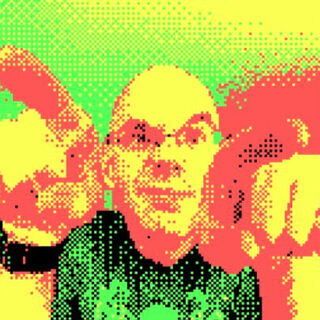
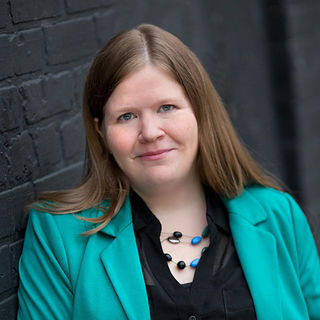
 From my mind to yours
10/15 '14
From my mind to yours
10/15 '14
ring ring ring
ring ring ring ring



 Ego balm
10/15 '14
Ego balm
10/15 '14
Want an ego boost? Just take that beginner class... again... simultaneously with an intermediate class.
Nothing like it for feeling better about yourself. And oh yeah, it's also good for getting the fundamentals right this time around and all that practical stuff.
On another subject: OPW just got RSS feeds for public posts. Click on me to view my posts, and you'll see an RSS icon next to my name.
Now you can export your fine quality OPW creations to folks who use [insert names of six different programs that have taken up the slack since Google Reader went away]. Or Livejournal syndicated feeds, even.
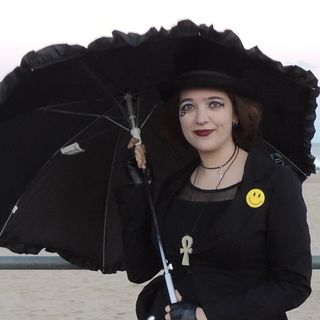 I used to write.
10/15 '14
I used to write.
10/15 '14
I used to write. I used to call myself a poet. I wrote in my journal often. I still have the stacks of them in a filing cabinet and still have the habit of keeping paper on me. But then... I don't know. I got into tech, I graduated college, I just lost the habit. I don't think my brain works the same way anymore. I say this as a psychology graduate too. I don't know how I feel about this. I'd say that if it bothered me that much that I'd work at getting back into the habit, but I don't know that it *does* bother me that much.
This online medium... I don't dislike it, but it is not the same as putting the pen to paper and that's part of why I say my brain doesn't work the same way. Typing is a much different tactile experience. Knowing on a keyboard the letter to touch when, for the most part they all feel the same, excepting the differences in muscle memory. Writing on paper is more sensory. I feel sorry for the kids who are growing up now that have always known computers and touch screens.
I mourn my old brain.
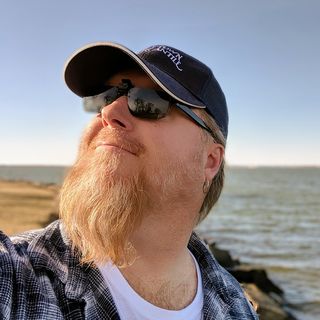
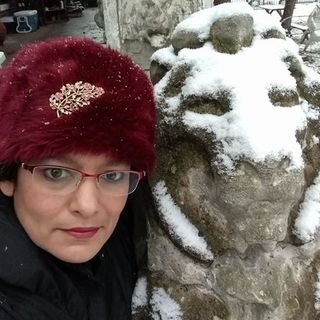 Balls said the Queen
10/14 '14
Balls said the Queen
10/14 '14
About 40 minutes north of me, twice a year there is a 3.5 day event called Playa del Fuego - PDF for short. It's part of the network of events that have come into being in the shadow of the awesomeness that is burning man. About 1200 people attend, many call themselves "Burners", and there is much effort into supporting the 10 principles of burning man (oh, google it if you want to know what they are). And yeah, we build art, drink, & burn things.
Anyhooo, this past weekend was my 6th (?) time at PDF, and my first time in a theme camp. Along with a few other locals, I founded Balls Camp. I had 150 pendants made and they were quite popular gifts.
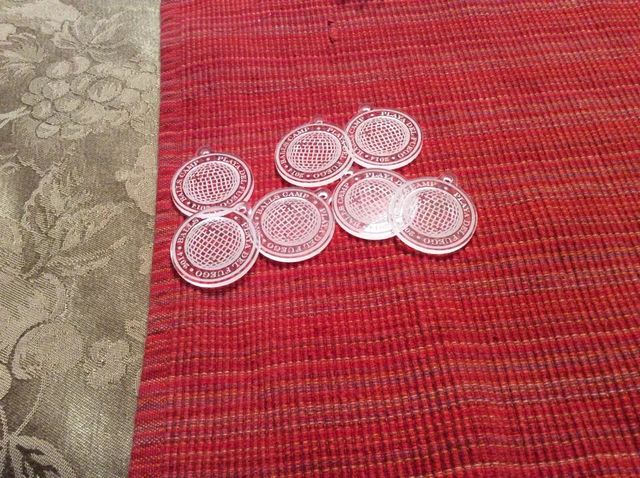
I made a bar, and it was quite popular for drinks. Here's a 3AM carnage shot.
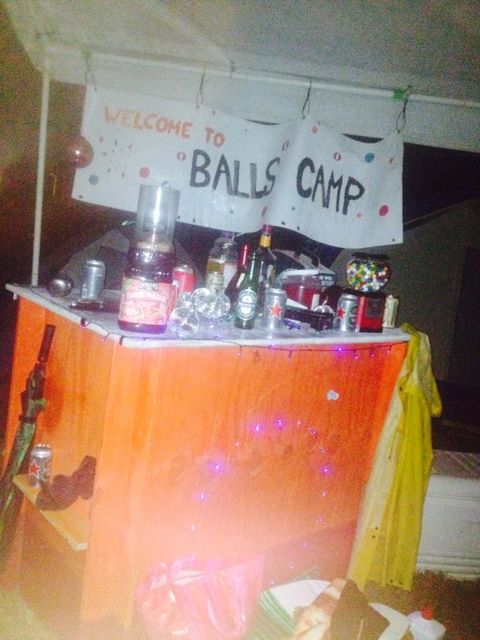
And I made a hanging ball sculpture art piece of sorts. Which was more awesome in real life than in this photo. People loved to play with the balls - see their reflections, swing them around. It was very cool.
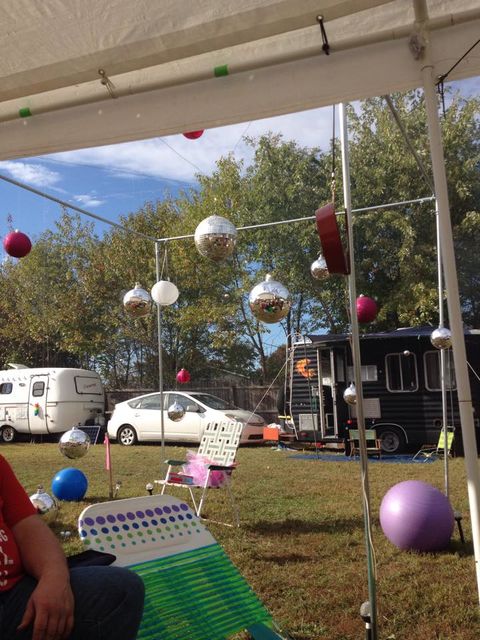
And a few more photos, since I'm very proud and satisfied (and still recovering) on how my first theme camp turned out.
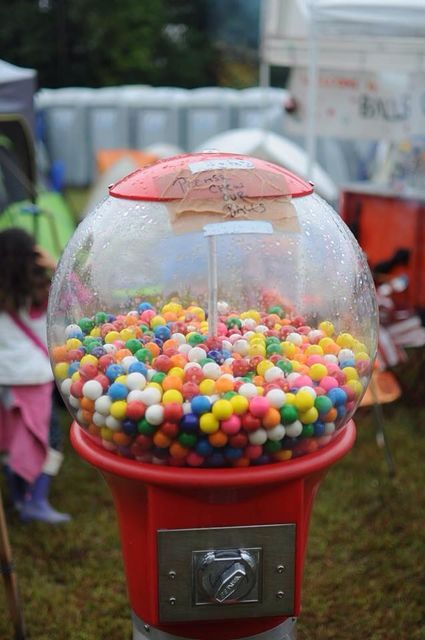
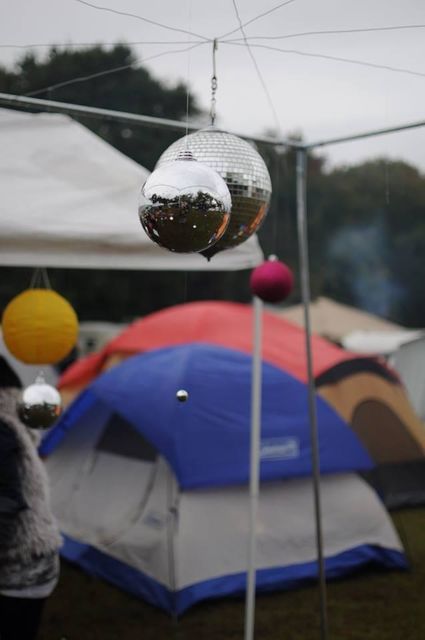
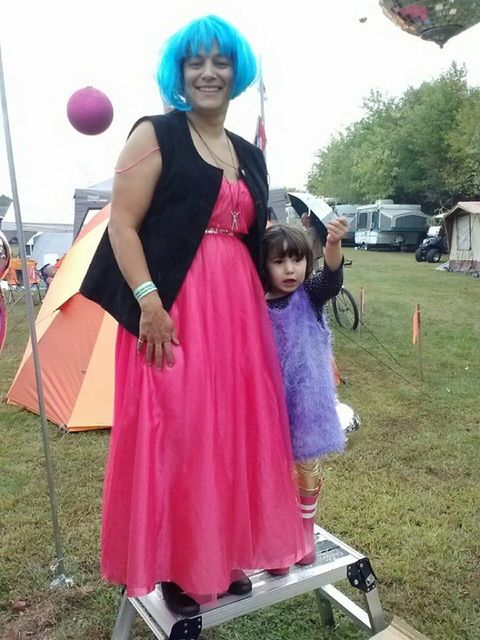

 Attention
10/14 '14
Attention
10/14 '14
I love the idea of this place. I tire of the daily parade of endlessly recycled images and headlines, sappy photos with even sappier text overlaid, whatever little shiny nugget of internet caught someone's attention long enough for them to click the "share" button.
I enjoy reading thoughtful stories about people's lives and interests. I like seeing opinions that differ from my own, and perhaps engaging in some friendly debate on one topic or another.
The difficulty, for me, is that I have little time and even less brain to compose such things myself. That other website fits my life perfectly right now. Two minutes here to snap a photo and toss it to the tide, hoping it will wash up on my friends' and relatives' shores. A few seconds there to catch up on a neighbor kid's antics and acknowledge with a single click. A moment later on to chime in with a sentence or two that might encourage a struggling friend. My support network, social calendar, and pocket photo album over coffee, all in one place.
(Cue the wailing and gnashing of teeth over the ever-declining depth of thought by today's young people, and how online sharing is destroying real community.)
No, that's not it. I passed "young" by anyone's standards, save maybe the retirement home ladies in my church choir, a decade back. I deeply cherish the face-to-face time I spend with friends and loved ones. However, as a mother of three active young children, and a homeschooler to boot, my time and attention are under near-constand demand. Those face-to-face times are rare. When they do happen, they are usually punctuated by the needs of little ones before any serious discussion can ever get off the ground.
I am stealing the time to write this right now from the quiet half-hour (if I'm lucky) between my awakening and the rest of the family stirring. These precious moments I usually use to pry my eyes open with a first cup of coffee, scan my email and whatnot to catch any urgent messages, and begin putting together the day in my head. I check our calendar, pore over lesson plans, and organize materials. If I can get myself to bed a little earlier at night and give myself a bit more time in the morning, I have a stack of reading and other projects, for my own benefit and my family's, piled to the ceiling. I have a blog I post to irregularly, when I can string together enough thoughts to make a paragraph or two.
And now my husband and my children are awake and foraging for breakfast, and thus my day begins and my attention span ends, until tomorrow...
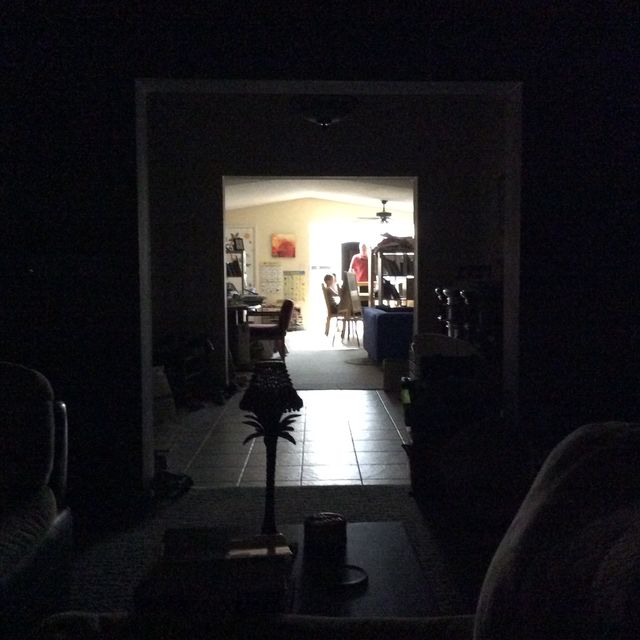

 Anime update: new season
10/14 '14
Anime update: new season
10/14 '14
I've checked in on more of the shows for the new season, so here are some first impressions.
Celestial Method seems like it has potential, aiming for the "dramatic yet cute" segment.
I Can't Understand What My Husband Is Saying is short (3-minute episodes) and funny, squarely targeting the more grown-up anime-watching crowd (and no, that's not an oxymoron).
I haven't been able to watch the entire first episode of Wolf Girl and Black Prince because the comedy is cringe-inducing, similar to Watamote. (Not as in bad, as in wanting to shout "NO don't SAY THAT augh you said it" at the main character.)
CROSS ANGE and Akatsuki no Yona both seem to be going for the Gritty Drama segment, and both are well-made enough that I'll be checking out more episodes.
At first The Fruit of Grisaia seems like it's going to be this season's That Show, but it actually seems to have some traces of plot under the surface, so I'll watch some more. TRINITY SEVEN looks like a better candidate for That Show, to the point where I haven't felt inspired to watch the entire first episode. We'll see.
Probably not going to continue watching Terraformars; guro really isn't my thing.
 Gratitude
10/14 '14
Gratitude
10/14 '14
Hey! Happy Thanksgiving to those wot celebrate it this weekend.
We just got back from dan's parents' place in southern PA. I'm thankful for a pair of mellow parents-out-of-law, who were great hosts, offered us the right amount of entertainment, sat with us and read companiably at other times, and fed us a delicious turkey dinner.
I'm thankful for a drive through windy twisty roads today, which were fun, and gorgeous with the fall foliage.
I'm thankful for a partner who makes me laugh, makes me think, and frequently prompts me to say "that is a really good idea."
And I'm thankful for a wonderful home to come home to, now containing three fairly sleepy mammals.
 O HAI [emerges from queue, dewy and fresh]
10/14 '14
O HAI [emerges from queue, dewy and fresh]
10/14 '14
If you're reading this, we have a posting queue now!
Here's how it works:
OLD THOUGHT PATTERN: "I would post this skydiving kitten pic but I might write War and Peace later and then I wouldn't be able to post it today, which would be very sad."
NEW THOUGHT PATTERN: "I'll just click 'queue' instead of 'post now' and it'll be posted for me, just before midnight, if I haven't posted something else that day. Oooo, handy!"
Yes, it says your post will appear tonight. But no worries: if you post something better by then, it'll automatically wait for tomorrow night.
In addition, you can have multiple posts still in "draft" form. Your current post-in-progress has always been automatically saved for you as a draft. Now you can click the "drats" button, click "New Draft" and start a second post-in-progress. Start as many drafts as you need.
Sean and I think we've done this in such a way that some will value and benefit from it, and others will cheerfully ignore it, and everyone will be happy. Your feedback on the reality is welcome.


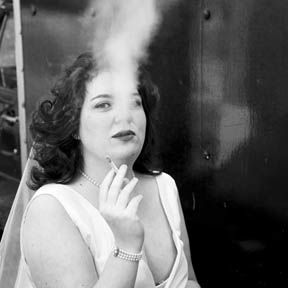

 Thankful
10/14 '14
Thankful
10/14 '14
We just got home from Thanksgiving at my parents' place, in southern Pennsylvania. ("But it's not Thanksgiving there, right?" "Yes, that's right. But they're retired. Every weekend is a long weekend for them. The issue is when we have a long weekend.")
It's still funny to me. They moved back to Lancaster County 2.5 years ago, after being away for 25 years; we moved when I was 12. So it's home, but it's the home I don't really know how to get around in (I never drove there), and the home I never had any adult responsibilities in. I have no idea how far it is from the middle school to where I grew up (it was a long time on the bus).
I wish it were an easier drive there (the wonderful roly-poly Pennsylvania hills, which make my soul sing in a way almost nothing else does, also prevent convenient north-south roads, though it must be said that Google thinks my little detours added a full 48 minutes to what is already a very long day's drive), but it's just a joy visiting there.
It's also great that my parents are much more relaxed post-retirement than pre-. There are all kinds of standard health issues (my dad is about to become guy-in-his-60s-number-23582509121-who-gets-new-knees), but all told, I think they're happier than they have been in years, which is good news indeed.
So I am thankful.
 writing fiction and feminism
10/13 '14
writing fiction and feminism
10/13 '14
Last night I stayed up until 3:44 am, reading Gillian Flynn's Dark Places and Sharp Objects. They were as compelling and painful as a very bad hangnail you have to worry away at all night. Serious nail biters will understand.
There's a lot of talk about Flynn's work lately (particularly Gone Girl) as anti-feminist, containing Men's Rights Activist language, misogynist, or a combination of these.
What I like about Flynn's work is the notion that evil exists and women are capable of it. I don't think that's anti-feminist.
When I was working on Fox Haven, I included a scene between the two adult women in the play, talking about the effect the main event of the play had on the larger community. I was criticized for including the scene, claiming that it slowed the play down, and that was actually fair. But I finally confessed to my director that it bothered me that the play didn't pass The Bechdel Test. In fact, the scene itself barely passed The Bechdel Test, because it started with, "Where's Tim?"
There were a lot of points where the play told me I was being a bad feminist, for, say, having a teenaged girl with eating disorders be a major part of the plot, or having a mean lady be a mean lady. Then I finally just threw up my hands and went back to square one, which is that if you don't have fully-rounded female characters who sometimes do bad things, and have female characters who only do good things, you're as bad as writers who put in women as set dressing (like Courtney Cox in Ace Ventura).
So, yeah, kudos to Flynn for shining a light on a kind of evil we didn;t want to think about.



